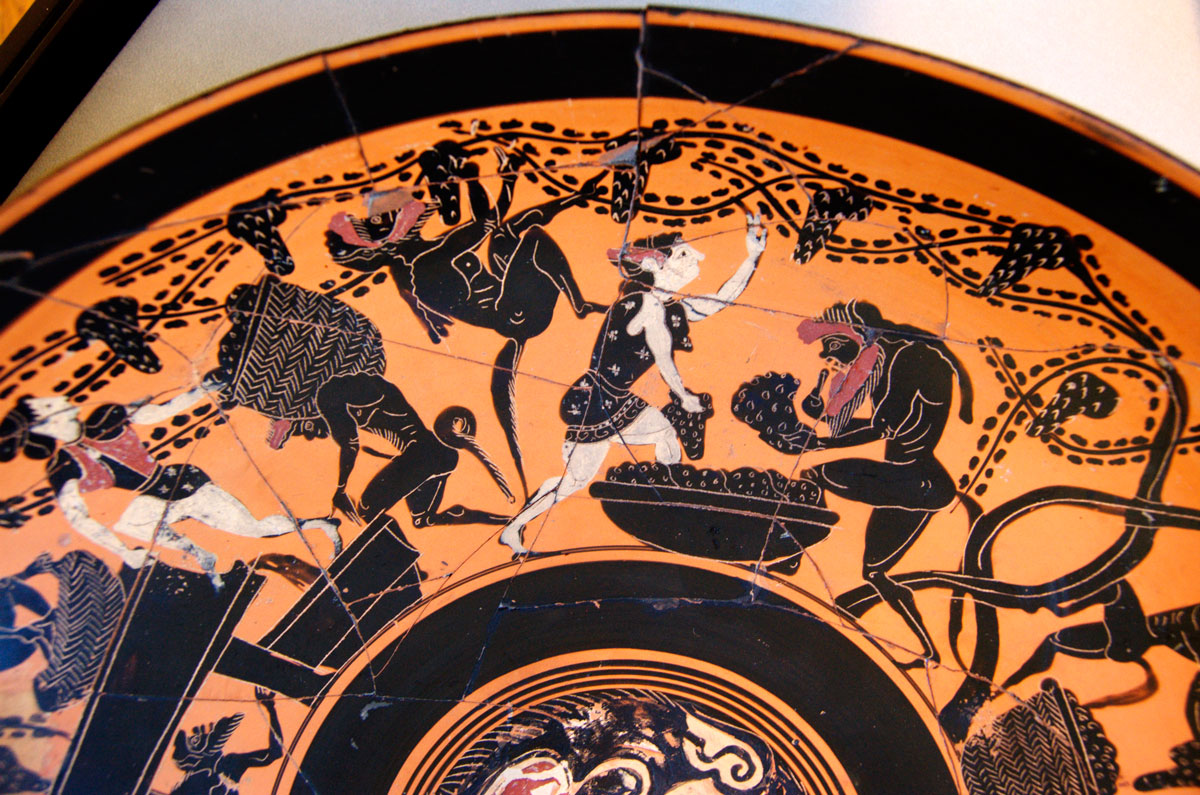Ancient Greeks refined the art of viticulture and brought wine into society. Yet an ideal of moderation permeated their lifestyle. Is there a lesson to learn?
The first historical evidence of viticulture was found somewhere near the Caucasus Mountains, more or less where Georgia and Armenia lie today. However, the first civilisation that truly glorified wine was – without a shadow of a doubt – Ancient Greece.
Wine in Greek culture
In classical Greek culture, wine was the staple around which philosophy, art, poetry, religion, music and political life revolved. It’s impossible to understand Grecian society without considering wine – even though the beverage then (spiced and diluted with water) was quite different to the one we drink today.
Wise men drank wine to expand their mind and praise the gods. Fermented grapes were supposed to have health benefits and were treated as essential nutrition. The greek narrator Homer famously described grape varieties, harvest, good places for wine, and drinking habits.
Hellenic people – especially from the Aegean Islands of Crete, Rhodes, and Lesvos – were the first to establish a large scale production and distribution of wine. They invented vessels to aid transportation and storage, as well as fancy goblets for wealthy people and other tools to enjoy the consumption of the praised vinous beverage.
God of wine
The Greeks had a highly regarded god for wine: Dionysius (later named Bacchus by the Romans). Son of Zeus and the Theban princess Semele, Dionysius represented a powerful yet ambiguous deity; together the most terrible and the most gentle. A god of the dead and of the living. Sometimes portrayed as a male other times as a female. All traits the Greeks also saw in wine.
The main celebration honouring the god of wine was the “Dyionissia” festival, held every year in April. Plays were regularly performed in the Theatre of Dionysus, located under the Parthenon.
Wine in social events
Fine wine was the social lubricant of the higher echelons of society. The pinnacle of the social calendar for a Hellenic man was the “symposium”. Accompanied by music, dancing and – of course – wine, these events were sumptuous banquets where intellectuals, politicians and philosophers used to gather.
Throughout a symposium, the participants usually sat on their reclined triclinia (a fancy sofa) engaging in conversations and eloquent speeches. Every guest was expected to consume the exact same amount of wine, either poured by slaves or passed among the partakers.

Greek moderation
You might be tempted to imagine ancient Greeks quaffing endless goblets of wine. Getting wasted in Athens streets, vomiting, intoxicated by one too many drinks. A typical Saturday night out in a British town centre, let’s say. This image couldn’t be farther from the truth.
Moderation played a central role in Greek culture. It is not a coincidence that the Greek civilisation created the gnōthi seauton (“know thyself”) motto. For these ancient souls, moderation meant knowing your limitations – and acting accordingly – avoiding excesses and pursuing balance in life.
In ancient Greek culture there was nothing wrong in itself with drinking. In fact, wine was an important product of civilisation. A gift from Dionysus for which mankind should be grateful and honoured. Nevertheless, they recognised the hazards of alcohol when used improperly.
In drinking, the Greeks advocated self-control and responsibility. The same hellenic virtues they encouraged in any other aspect of life.
Three glasses
The ancient Greeks went as far as suggesting the exact amount of wine they should drink. Three was their magic number. After the third glass of wine, the Greek man should stop, call it a day and go to bed. Unsurprisingly, three glasses for each guest was also considered a reasonable quantity of wine for a symposium.
In a fragment of a play by Eubulus, an Athenian poet of the 4th century BC, Dionysus says:
“I mix three kraters only for those who are wise.
One is for good health, which they drink first.
The second is for love and pleasure.
The third is for sleep, and when they have drunk it those who are wise wander homewards.
The fourth is no longer ours, but belongs to hubris.
The fifth leads to shouting.
The sixth to a drunken revel.
The seventh to black eyes.
The eighth to a summons.
The ninth to bile.
The tenth to madness, in that it makes people throw things”
After three kraters (glasses), Eubulus describes a crescendo of unambiguously negative consequences taking place. The first being hubris – sometimes loosely translated as “arrogance”.

Hubris and Sophrosyne
Ancient Greeks considered Hubris (ὕβρις) the most pernicious sin a human could commit. It meant overstepping your own capabilities, indulging in excesses. Being somehow arrogant, thus challenging the gods. And leading inexorably to downfall. Hubris is what made Icarus fall, punished for being presumptuous – he wished to fly too high and too close to the sun.
Hubris is the antithesis of sophrosyne – the noblest virtue, the ideal of excellence for the Greeks. Sophrosyne (σωφροσύνη), a term which has no direct translation in modern language, is a mixture of soundness of mind, moderation, sobriety and self-control.
Incidentally, this ancient idea of measure and control might explain why most wine bottles nowadays contain 750 ml of liquid. Some believe this standard measure was set up to contain the exact amount of recommended wine portions for two people. Six medium (125 ml) glasses in total, three for each drinker. Although fascinating, I’m not sure about the veracity of this theory.
Final thoughts
I could have just summarised this blog article as “drink in moderation” – perhaps in a big, bold font – at the centre of the page. That would have broadcasted the same message… theoretically.
But I want this blog to emphasise the story element of wine: an advice, a suggestion, or even a lesson, is better taught through a good story.
Ancient Greeks were serious people. They knew how to live well. Or rather, they knew how to live properly and with dignity. The key concept to live such a good life – I firmly believe – is moderation.
So why don’t we all consider the example of a civilisation that probably produced the largest body of knowledge throughout history in philosophy, medicine, mathematics, science? Let’s do as the wise ancient Greeks: drink responsibly, know our limit and respect it.
Next week we are talking about… Bordeaux! Stay tuned for more vinous narratives!


Comments · 1